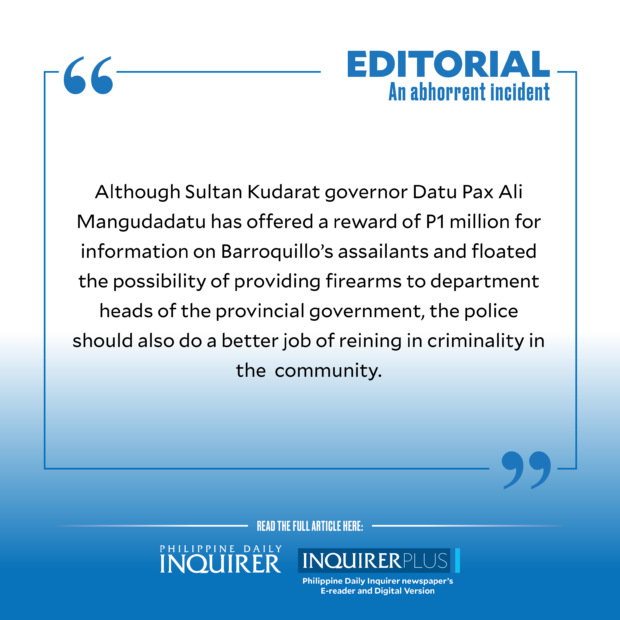An abhorrent incident

Who knows what evil lurks in the hearts of men?
This initial aghast and hapless reaction over the recent ambush of a young doctor on her way to work in Sultan Kudarat, Maguindanao, was quickly replaced with outrage when more details surfaced about the incident.
Dr. Sharmaine Ceballos Barroquillo, a government physician, was driving her car in Buluan, Maguindanao del Sur, on the evening of Feb. 3 when she was shot thrice by unidentified assailants on a motorcycle. Though wounded and with the gunmen in pursuit, she managed to drive herself to hospital but lost control of her vehicle over the rough and unlighted roads of Paglas, where she hit a tricycle and a house, injuring three persons. Despite her critical condition, the 27-year-old survived what police have described as a holdup attempt.
Article continues after this advertisementPeople have wondered, and rightly so, why this violence was visited on a young doctor who has presumably traded better professional prospects for the scant rewards and risks of a government posting in a remote area.
Health Secretary Teodoro Herbosa surely spoke for most of us when he condemned the incident: “We are already short of health workers in the country because they are going overseas in search of greener pastures. And those who chose to stay here are being killed? We abhor this kind of behavior,” he said.
Shallow pool
Barroquillo’s batchmates from the Davao Medical School Foundation Inc. described the situation more succinctly: “We live in a country where six out of 10 Filipinos die without seeing a doctor. We live in a country where there is one doctor per 26,000 people,” the group’s statement noted.In fact, in 2019, prior to the onset of the COVID-19 pandemic, an interagency policy and program support network led by the Department of Health (DOH) estimated a shortage of about 290,000 health workers in the country. A Philippine Overseas Employment Administration report in 2020 meanwhile showed an annual out-migration of 13,000 health-care professionals, further depleting the country’s shallow pool of health workers.
Article continues after this advertisementAdding to the grief is the fact that not only criminal elements, but even state actors, have targeted health workers—some for their perceived political beliefs. A case in point is the killing of Dr. Mary Rose Sancelan and her husband Edwin in Guihulngan, Negros, in December 2020 by gunmen on a motorcycle. Sancelan, who headed the government’s task force on COVID-19 in the city, was on top of the hit list of a local anti-communist group, the rights group Karapatan said.
‘Systematic killings’
“Dr. Sancelan was branded, vilified, Red-tagged, and now, executed, by the ruthless pawns of the enablers of ‘systematic killings’ in this country,” Catholic Bishop Gerardo Alminaza said of the incident.
The Sancelans’ killing and the ambush on Barroquillo again draw attention to the continuing threats and killings in the country, despite the government’s steadfast denial of such impunity to United Nations Special Rapporteur Irene Khan who recently visited the country to verify reports of rife rights violations. Why the government turns a blind eye on violent attacks abetted by state-sponsored Red-tagging is a question it has yet to answer.
Doctors assigned in conflict-ridden remote areas have more than their fair share of such threats and should be protected by the government, noted Sen. Aquilino “Koko” Pimentel III, who hails from Mindanao himself. Aside from enjoining the government to prioritize the security of these “educated and knowledgeable people with the ability to improve our health and general well-being,” Pimentel also urged authorities to hunt down and immediately arrest the gunmen behind the ambush lest it create a “chilling effect” among doctors who serve in far-flung communities.
Notorious route
Although Sultan Kudarat governor Datu Pax Ali Mangudadatu has offered a reward of P1 million for information on Barroquillo’s assailants and floated the possibility of providing firearms to department heads of the provincial government, the police should also do a better job of reining in criminality in the community. Instead of police provincial director Col. Roel Sermese disputing claims about the “daily shooting incidents” at the national highway in Datu Paglas town, he should take note of the Nov. 12 robbery/killing of an Indian moneylender in a daytime highway heist in Buluan.
At the very least, local officials should maintain a police checkpoint in the area to discourage criminal elements from staging their violent heists on this notorious route. As well, noted Barroquillo’s father, Oliver, in his Feb. 11 social media post, the local and provincial governments should set aside a budget “to repair roads, install solar lights, and CCTV,” as part of crime prevention. His daughter’s attempt to escape, he added, “was hampered by broken and unlighted roads.”
Is it too much to ask government officials to ensure the safety of medical frontliners who risk life and limb serving the country?
















